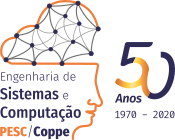Events Calendar
|
***
ATENÇÃO: Seminário cancelado em vista do Fabricio não ter conseguido embarcar para o Brasil.
***
Fabricio Murai é aluno de doutorado na UMass, Amherst (EUA) com passagem pelo PESC onde fez mestrado com Bolsa Nota 10. Ele estará nos visitando na próxima quarta e vai proferir uma palestra sobre seu trabalho de doutorado, como parte da preparação para concurso para professor (no Brasil!).
---
Palestrante:
Fabricio Murai - Aluno de Doutorado, UMass, Amherst (EUA)
Título:
Aplicações de Amostragem e Estimação em Redes e Grafos
Dia/horário/local:
Quarta, 3 de agosto, 14h, sala H-324B
Resumo:
A general trend has permeated the sciences over the last two decades: the research focus has often shifted to studying entities collectively rather than in isolation, giving rise to a field referred as network science. The key to understanding the importance of this field lies in the relationship between structure and function on networks: structure can shape the effectiveness and efficiency of processes that run on top of a network; in turn, these very processes can shape the structure or formation of networks. As a result, a major effort in this field has focused on two aspects: (i) characterizing and modeling real networks and (ii) studying processes and developing algorithms to enhance/thwart the performance of these processes on networks. In this talk, we discuss applications of sampling and estimation to problems related to each of these aspects.
First, we consider the problem of estimating the in-degree distribution of a graph via independent edge sampling. We derive error bounds for the in-degree distribution estimation from an information-theoretic perspective. We find that the recoverability of the original distribution presents a sharp threshold with respect to the fraction of edges sampled from the vertices. If this fraction lies below the threshold, typically half of the elements in power-law and heavier-than-exponential-tailed distributions, then the original set size distribution is unrecoverable.
Next, we consider the problem of crawling a network to find nodes that exhibit a specific trait (targets) given a budget by learning a model from node attributes and structural properties. This problem has applications to campaign recruitment in online social networks. We find that simply alternating between several statistical models often discovers more target nodes than the best of these models used alone. The performance of a standalone model erodes over time, due to what we call the "tunnel vision effect". We show that diversity in the training data, achieved by the use of multiple models, is crucial to mitigate that effect. We propose a method based on Multi-Armed Bandits for non-stationary reward distributions that alternates between multiple models in an intelligent way, matching or exceeding the performance of 10 competing methods on all seven network datasets used in our simulations.
Last, I will talk about future research directions, including the problem of A/B testing on networks.
Bio resumida:
Fabri?cio Murai se formou B.Sc. em Cie?ncia da Computac?a?o (magna cum laude) pelo DCC/UFRJ e M.Sc. em Engenharia de Sistemas de Computac?a?o no PESCCOPPE/UFRJ, em 2007 e 2011, respectivamente. Atualmente e? candidato de doutorado no College of Information and Computer Sciences da Universidade de Massachusetts em Amherst, sendo orientado pelo Prof. Don Towsley. Fabri?cio concluiu o portfolio (exame de qualificac?a?o) com distinc?a?o e recebeu o 2013 Outstanding Synthesis Award do programa por um dos seus projetos de pesquisa. Seus interesses de pesquisa incluem modelagem matema?tica, estati?stica, teoria da informac?a?o e aprendizado de ma?quina, tendo como foco sua aplicac?a?o a redes de computadores, sociais e informacionais (p. ex., a Web).






